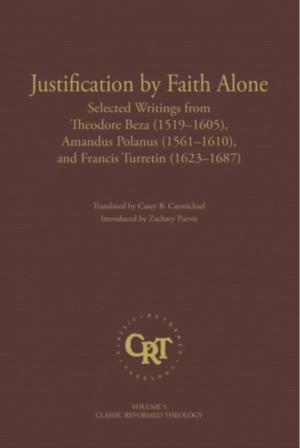For many evangelicals and for some ostensibly Reformed folk it has been fashionable for the last several years to teach that we are justified now by grace alone (sola gratia), through faith alone (sola fide), based on Christ’s righteousness imputed, but that . . . Continue reading →
Sola Gratia
Coming In December, 2022: Beza, Polanus, And Turretin On Justification
From its inception, the goal of the Classic Reformed Theology Series from Reformation Heritage Books (sponsor of the Heidelcast) has been to present, in English, primary source texts in Reformed theology. This new volume is the sixth in the series, which began . . . Continue reading →
On Justification In Romans And Hebrews
One does not often think of Hebrews when it comes to the doctrine of justification—we normally go right to Paul’s writings. Continue reading
Romans 5:9–10: You Were Justified And You Shall Be Saved Sola Gratia, Sola Fide
For many evangelicals and for some ostensibly Reformed folk it has been fashionable for the last several years to teach that we are justified now by grace alone (sola gratia), through faith alone (sola fide), on the basis of Christ’s righteousness imputed . . . Continue reading →
How Did We Come To Faith?
Why should we study what the Bible says about how we came to faith in Jesus? Isn’t it enough to simply believe and let it go? After all, do not such discussions only cause hurt feelings and doctrinal arguments among believers? These are good questions. Here are two answers. First, Jesus himself calls us to pay attention to His hard words. Continue reading →
Heidelcast 205—What Must A Christian Believe? (21): The Forgiveness Of Sins (3)
This is episode 21 in the series, What Must A Christian Believe? In our survey of the rule of faith, i.e., the Apostles’ Creed, we are completing our brief study of the tenth article, “the forgiveness of sins.” The doctrine of justification . . . Continue reading →
Heidelcast 204—What Must A Christian Believe? (20): The Forgiveness Of Sins (2)
This is episode 20 in the series, What Must A Christian Believe? In our survey of the rule of faith, i.e., the Apostles’ Creed, we have reached the tenth article, “the forgiveness of sins.” The truth of our righteousness with God is essential . . . Continue reading →
Heidelcast 202—What Must A Christian Believe? (19): The Forgiveness Of Sins (1)
This is episode 19 in the series, What Must A Christian Believe? In our survey of the rule of faith, i.e., the Apostles’ Creed, we have reached the tenth article, “the forgiveness of sins.” That phrase does not occur in the earliest . . . Continue reading →
Heidelcast 194: What Must A Christian Believe? (11) On Christ’s Obedience And Atoning Death
In our survey of the rule of faith, i.e., the Apostles’ Creed, we have reached the fourth article: “suffered under Pontius, Pilate, crucified, dead, and buried. He descended into hell.” In this episode we consider Christ’s suffering and death and in the . . . Continue reading →
A True Epitaph: “Saved By Grace”
On a tombstone in the old graveyard behind the Meeting House at Knockbracken, nestling among the evergreens, rising from the grass, on a well-mown grassy mound, is a plain and modest headstone: etched upon its granite face is the name of both . . . Continue reading →
Perkins: Eternal Life Is By Grace Alone, Through Faith Alone
If the inheritance of life eternal be by the law, it is no more by the promise. But it is by the promise because God gave it unto Abraham freely by promise. Therefore it comes not by the law. The opposition between . . . Continue reading →
The Gospel Is About Justice But Not That Kind Of Justice
In an article in By Faith Online (Feb, 2021) Megan Fowler writes, “Moses Lee believes Gen Z isn’t asking philosophical questions about epistemology [the theory of knowing]. Gen Z wants to know that the gospel is beautiful and true, and that it is deeply concerned about justice.” Continue reading
Calvin: The Whole Doctrine Of Godliness Rests Upon The Doctrine Of Salvation Through Free Grace
The principal design of preaching the Gospel is, that men may be reconciled to God, and this is accomplished by the unconditional pardon of sins; as Paul also informs us, when he calls the Gospel, on this account, the ministry of reconciliation, . . . Continue reading →
Walter Marshall’s Antidote To Nomism
“[T]hat we must be reconciled to God, and justified by the remission of our sins, and imputation of righteousness, before any sincere obedience to the law; that we may be enabled for the practice of it. They account, that this doctrine tends . . . Continue reading →
With The Guilt, Grace, Gratitude Podcast Talking About The History Of The Reformation
I had fun talking with Nick Fullwiler of the Guilt, Grace, Gratitude podcast about the history of the Reformation. What led to it and why did it happen? Is there a new Reformation under way today? Do we need a Reformation today . . . Continue reading →
Are Good Works Enough?
Good works proceed from saving faith; faith that does not bear fruit is not saving faith (see James 2:19). James 2:24 is talking about works as fruit and evidence of saving faith, not meritorious works that save us. In fact, James reminds . . . Continue reading →
Heidelcast 160: As It Was In The Days Of Noah (7): Christ’s Abounding Graces
One of the principal reasons I became an amillennialist in eschatology was my study of 1 and 2 Peter. One of the reasons that, after study, investigation, and prayer, I rejected the claims of the Pentecostal moment is the triumphalism of the . . . Continue reading →
In His Covenant Faithfulness He Remembered Us In Our Low Estate
It is Yahweh who remembered us in our low estate, for his covenant faithfulness endures forever; and snatched us from our foes, for his covenant faithfulness endures forever; he who gives food to all flesh, for his covenant faithfulness endures forever. Give . . . Continue reading →
Marrowmen: Our Good Works Are Not Instrumental Or Causal In Our Justification Or Salvation
“If a sinner, being justified, has all things at once that are necessary for salvation? And if personal holiness, and progress in holy obedience, is not necessary to a justified persons’s possession of glory, in case of his continuing in life after . . . Continue reading →
Hodge: Justification By Our Works Is Impossible
In the first place, that the righteousness by which we are justified before God is not of works, is not only asserted, but proved. The apostle’s first argument on this point is derived from the consideration, that the law demands a perfect . . . Continue reading →






